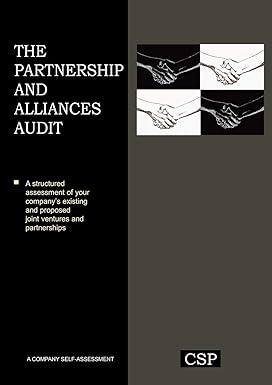Question
Question 1. Which of the following is false regarding an acquired intangible asset from a government grant? A. An example of an acquired intangible asset
Question 1. Which of the following is false regarding an acquired intangible asset from a government grant?
A. An example of an acquired intangible asset from a government grant is airport landing rights.
B. It is initially measured at either (a) its fair value or (b) its nominal amount plus any directly attributable expenditure to prepare the asset for its intended use.
C. It is measured at its fair value at the time of implementation.
D. It may be acquired free of charge.
Question 2. An entity can recognise an intangible asset for in- process research and development if the costs are incurred during:
A. The development phase and meet the recognition criteria
B. During the research phase of the project
C. The entire project
D. The development phase, no criteria are required
Question 3. Which of the following are examples of an intangible asset under IAS 38? Select all that apply.
A. Franchise agreements
B. Monetary assets
C. Import quotas
D. Internally-generated goodwill
Question 4. When capitalising development costs, which of the following costs might be included? Select all that apply.
A. Materials used and services consumed
B. Costs of acquiring assets that were previously recognised as an expense
C. Start-up costs
D. Fees to register a legal right
Question 5. Which of the following costs are directly attributable to the cost of an internally generated intangible asset? Select all that apply.
A. Costs of materials used and services consumed in generating the intangible asset
B. Cost of advertising and promotion relating to the introduction of a new product
C. Amortization of patents and licenses used to generate the intangible asset
D. Cost of employee benefits arising from the generation of the intangible asset
Question 6. Which of the following is true regarding an intangible asset that is recognised in a business combination?
A. It should be recognised if it only meets the separability criterion (i.e., to be recognized separate from goodwill).
B. It should be recognised at an entity-specific measurement as of the acquisition date.
C. It can be recognised whether or not it was recognised by the acquiree.
D. It should be recognised if it only arises from contractual or other legal rights.
Step by Step Solution
There are 3 Steps involved in it
Step: 1

Get Instant Access to Expert-Tailored Solutions
See step-by-step solutions with expert insights and AI powered tools for academic success
Step: 2

Step: 3

Ace Your Homework with AI
Get the answers you need in no time with our AI-driven, step-by-step assistance
Get Started


